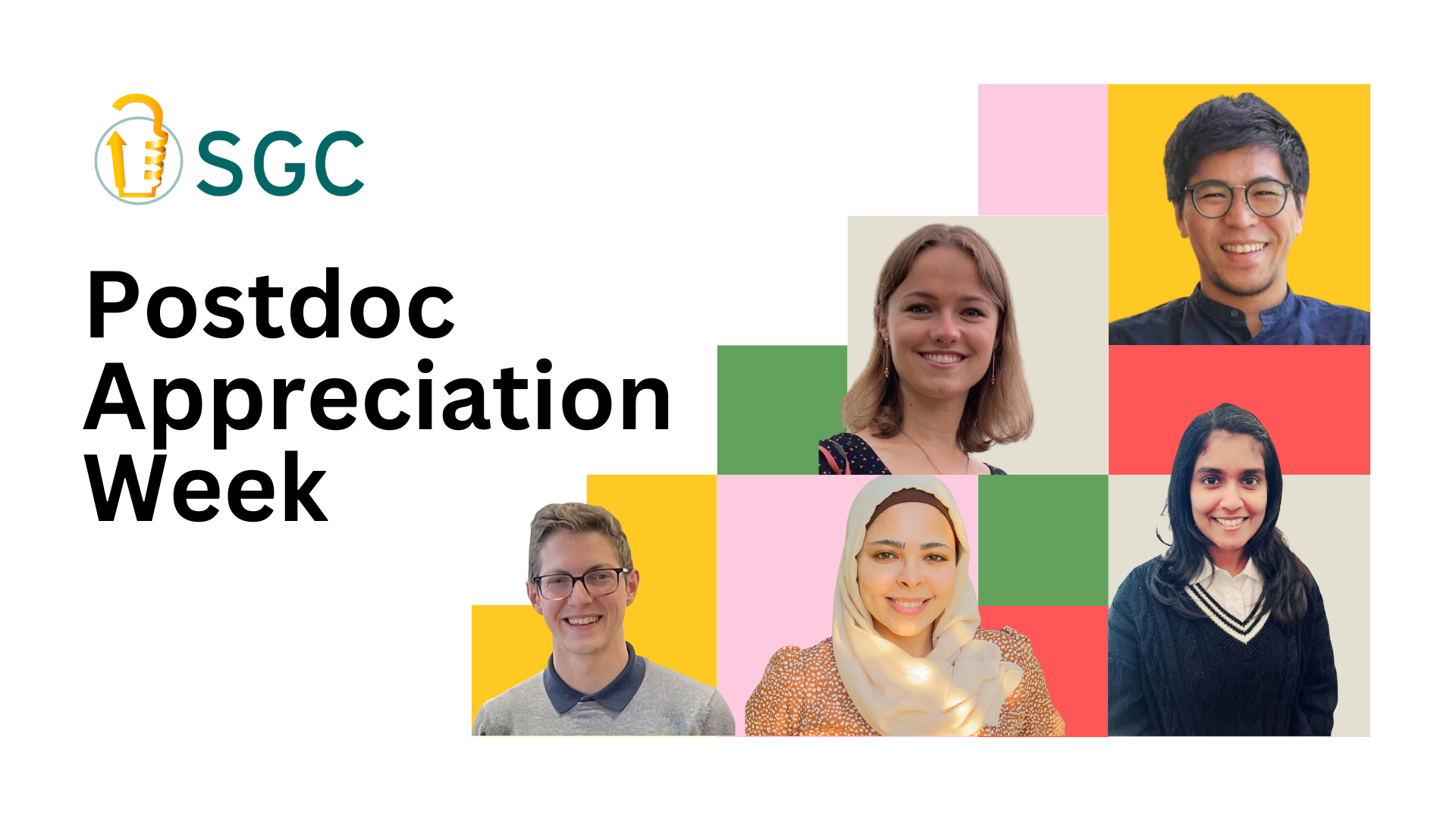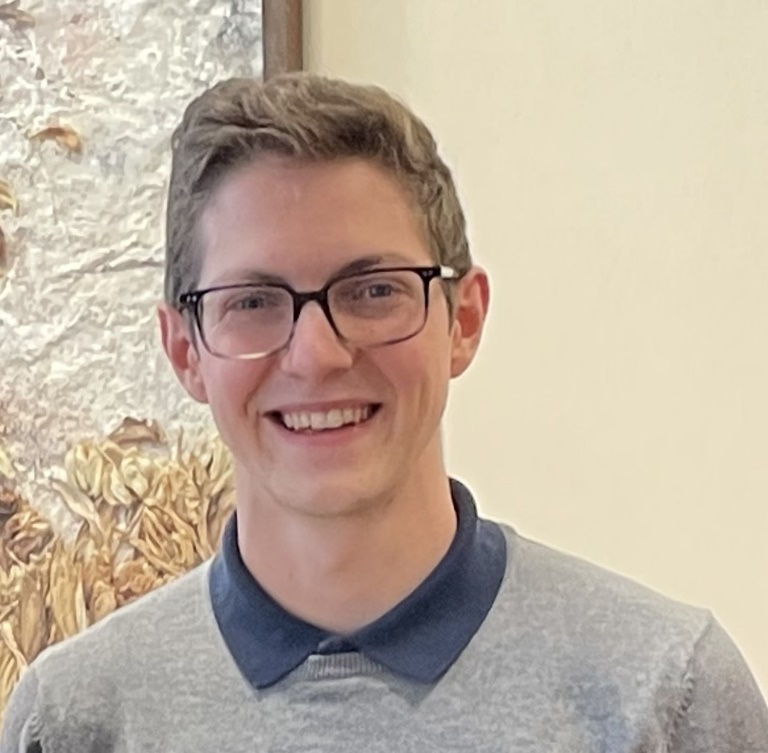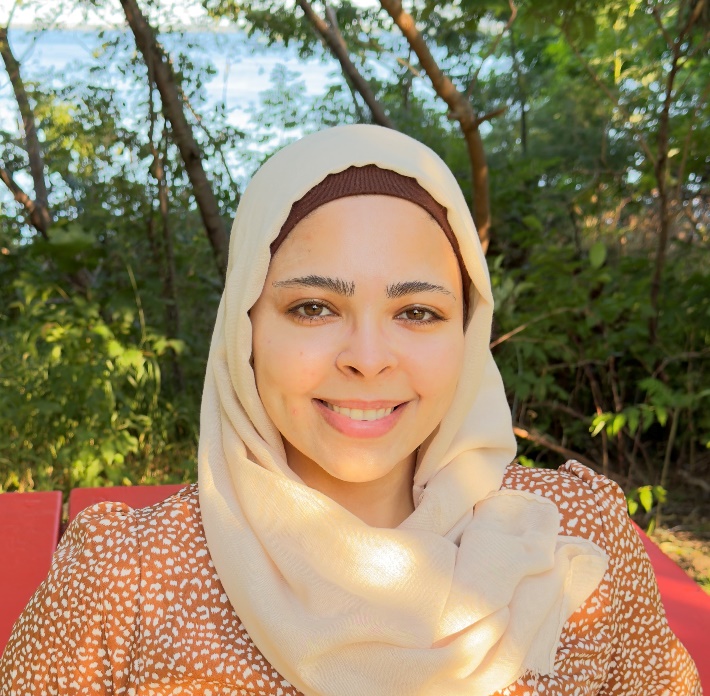
Celebrating the Impact of SGC Postdocs on Open Science
This week, in honor of National Postdoc Appreciation Week, we are excited to spotlight the incredible contributions of the Structural Genomics Consortium (SGC) postdoctoral researchers across all our research sites. These talented individuals are the engine driving forward innovative, open-access research in previously unexplored areas of biology.
At SGC, we take immense pride in fostering a culture of collaboration, respect, and support for underrepresented individuals, empowering postdocs to thrive both personally and professionally. As key members of our global network of over 250 scientists, they benefit from a unique training environment that bridges academic rigor with industry expertise, offering a learning experience unparalleled worldwide. By exposing them to academic-industry partnerships, we provide our trainees with a broad perspective on career possibilities, enriching their journey and enhancing their impact on the scientific world.
Many of our SGC alumni have gone on to hold academic and business leadership positions, becoming professors, department chairs, or scientific leaders in major pharmaceutical companies. This success is a testament to the rigorous and interdisciplinary training they received while at SGC, where they were encouraged to openly share, publish, and present their research. As we continue to shape the next generation of scientific leaders, we remain committed to supporting their development through open science, collaboration, and innovation. This National Postdoc Appreciation Week, we celebrate not just the achievements of our current postdocs, but also their potential to shape the future of science for generations to come.
We spoke with five talented young scientists about their projects, their motivation to continue on the academic track, and their experience working at SGC.
Madhushika Silva
Working at SGC-Toronto under the supervision of Dr. Cheryl Arrowsmith.
 Tell us about your research:
Tell us about your research:
I use biophysical methods to study the interactions between drugs and their molecular targets (such as proteins or DNA) at the molecular level. This leads to a deeper understanding of how drugs work, offering insights into their efficacy and potential side effects. It's a way to see the "hidden" world of molecular interactions that drive biological functions and diseases. Biophysical methods can speed up drug discovery by allowing researchers to screen compounds more efficiently, identify promising drug candidates early on, and avoid costly failures later in the clinical trial phase. Additionally, they can tackle "undruggable" or challenging targets, such as protein-protein interactions, which are difficult to address using traditional drug discovery methods. This opens up new avenues for treating diseases that have been hard to address with existing drugs.
What motivated you to pursue your current research focus, and how did your previous academic experiences shape this decision?
During my Ph.D. I studied protein structure and function. Proteins are often referred to as the "workhorses" of the cell. Their functions, ranging from catalysis (enzymes) to signalling, transport, and structural support, are all dictated by their structures. By studying how proteins fold, interact with partners, and perform their tasks, we can aim to unlock the fundamental principles governing life at the molecular level. The multidisciplinary nature of studying proteins excites me, as it allows collaboration across diverse fields to solve complex problems. Biophysical drug discovery being inherently interdisciplinary, sitting at the crossroads of biology, chemistry, and physics fosters innovation and new ways of thinking about drug discovery, making it an exciting field to further navigate.
What advice would you give to someone considering a postdoctoral position at the SGC or in your field of research?
A postdoc is a time to transition from following instructions to taking full ownership of a project. Lead your research, manage your experiments, and make strategic decisions.
How has your time at the SGC influenced your approach to research or your future career aspirations?
As a member of the Biophysics group at SGC, I have further specialized in biophysical drug discovery. This significantly enhances my career by providing me with cutting-edge skills, increasing my employability in both academia and industry, and offering numerous opportunities for leadership, collaboration, and innovation. The field’s interdisciplinary nature, focus on precision medicine, and high potential for societal impact make it a strong and rewarding career path.
Martin Schwalm
Working at SGC-Frankfurt under the supervision of Dr. Stefan Knapp.
 Tell us about your research:
Tell us about your research:
My research focuses on targeted protein degradation and the identification and understanding of the underlying cellular mechanisms. The field of induced proximity is fascinating because of the much broader range of targets and the ability to target proteins that were previously thought to be undruggable. I agree with what a colleague once said at a conference to me: “Once you go into proximity, you never go back - unless you realize it doesn't work”.
Is there a publication that you are involved in that you are particularly proud of? Why?
The development and characterization of the chemical probe for GID4 is a great demonstration of how collaboration can achieve amazing things, and it was an honour to be part of it. SCG, in collaboration with Pfizer, ETH Zurich and many others, joined forces and we were able to not only find a ligand for a novel E3 ligase but also use it to further understand the underlying biology. It was a prime example of the usefulness of chemical probes and showed me how powerful a productive team of experts can be.
Read more about this publication: https://www.nature.com/articles/s41589-024-01618-0#Abs1
What is one piece of advice you received during your academic journey that has stuck with you?
During my undergraduate studies, I had a fantastic supervisor who encouraged me to use my creativity to solve problems and gave me the freedom to make mistakes. Understanding how creativity can be the missing link when you are stuck in a problem that cannot be solved by pure logic was a key learning that also kept me motivated. Sometimes the cells don't follow your logic, and you have to find the trick.
What has been the most rewarding or surprising aspect of working at the SGC so far?
The opportunity to work on industry projects at SGC can significantly broaden your knowledge and optimize your problem solving. Having regular input from the world-leading teams of our pharmaceutical partners has reshaped my critical thinking and significantly increased my productivity. I am grateful for the opportunity to gain this insight into the different teams and companies, an opportunity that is unique to my knowledge.
Riham Ayoubi
Working at SGC-Neuro under the supervision of Dr. Peter S. McPherson.
 Tell us about your research:
Tell us about your research:
Working with antibodies during my PhD, I have always felt a lack of confidence in my results because of the uncertainty surrounding the antibody’s ability to recognize my protein of interest. Testing antibodies through the YCharOS open ecosystem and in the presence of a knockout negative control that reveals the identity of the signal allows me to study how different antibodies can behave. After testing hundreds of products, the way antibody performance remains unpredictable does not cease to fascinate me.
Is there a publication that you are involved in that you are particularly proud of?
One major milestone in YCharos’s journey and my career is the standard procedures established to compare antibody performance in main research applications. These consensus protocols were approved by major industry partners in order to support uniform antibody characterization and allowed the quantification of the antibody liability crisis based on performance.
Read more about Riham’s publication: https://doi.org/10.21203/rs.3.pex-2607/v1
In what ways do you collaborate with other researchers at the SGC, and how has this collaboration enhanced your work?
The SGC’s expertise and availability in different areas of research has been reassuring. SGC researchers supported me in providing tools without which my project wouldn’t have been completed on time.
What’s a misconception about your research that you’d like to debunk?
Misconception: Recombinant monoclonal antibodies perform less because they are only able to recognize one epitope of the antigen. Debunked here: doi.org/10.7554/eLife.91645.2.
Kang-cheng Liu
Working at SGC-Karolinska under the co-supervision of Michael Sundström and Opher Gileadi.
 Tell us about your research:
Tell us about your research:
I generate and validate antibodies targeting human proteins. I produce antigens based on other teams’ requests and send them to Lund University for screening against their antibody library. After screening, I test candidates using mammalian cell-expressed proteins and immunoprecipitation. Validated antibodies are provided to research teams, and their sequences are also made available to the scientific community.
What motivated you to pursue your current research focus, and how did your previous academic experiences shape this decision?
I’m trained as a protein biochemist, and my current role is a great fit. My last postdoc was more about pure academic research, diving into unknown life phenomena with less focus on applied science. Now, at SGC, the close collaboration between academia and industry really resonates with me, especially since it’s all about advancing medicine and treatments. I find this environment super inspiring and motivating.
What’s a piece of advice you’d give your past self at the beginning of your postdoc journey that would have made a difference?
If I could give my past self some advice at the start of my postdoc, I’d say: jump on every opportunity to learn new techniques, try out different methods, and connect with experts in various fields. Expanding your skills and network will lead to unexpected collaborations.
Can you share a moment or experience at the SGC that has been particularly impactful or memorable for you?
One of my standout moments was attending SGC's 20th Anniversary Symposium in Stockholm in 2023. Even though I’ve only been with SGC for a year and a half, seeing the amazing achievements and the impact of open science through long-term collaborations was truly inspiring.
What’s a misconception about your research that you’d like to debunk?
Not All Antibodies Are Created Equal. In many immunoassays, such as Western blotting, and immunohistochemistry, protein samples are analyzed under denaturing conditions. Conversely, in assays like ELISA, surface plasmon resonance, or immunoprecipitation, antibodies are designed to bind to native proteins. So, it's important to pick the right antibody for your experiment. Make sure to find a reliable source with validation data that fits your needs.
Eve Carter
Working at SGC-UCL under the supervision of Mat Todd.
 Tell us about your research:
Tell us about your research:
I am researching non-hormonal contraceptives, funded by the Bill & Melinda Gates Foundation. I believe that increasing contraceptive options, in particular non-hormonal options, is important due to concerns over the safety and side effects of current hormonal methods. This project has allowed me to collaborate with SGC scientists across different sites and learn lots of new techniques.
What motivated you to pursue your current research focus, and how did your previous academic experiences shape this decision?
My previous research projects were in synthetic organic chemistry and biocatalysis. While I enjoyed this, I wanted to research something that had a clearer purpose. I believe that my research with the SGC into non-hormonal contraceptives has a clear and important purpose.
What is one piece of advice you received during your academic journey that has stuck with you?
As a postdoc, try to learn new skills and techniques from the capable people around you, even if they are out of your usual research field.
Can you share a moment or experience at the SGC that has been particularly impactful or memorable for you?
I visited the SGC labs in Toronto near the start of my postdoc. Madison Edwards taught me how to express and purify recombinant proteins, which was new to me as an organic chemist. She was very patient and explained things clearly, which I appreciated.
